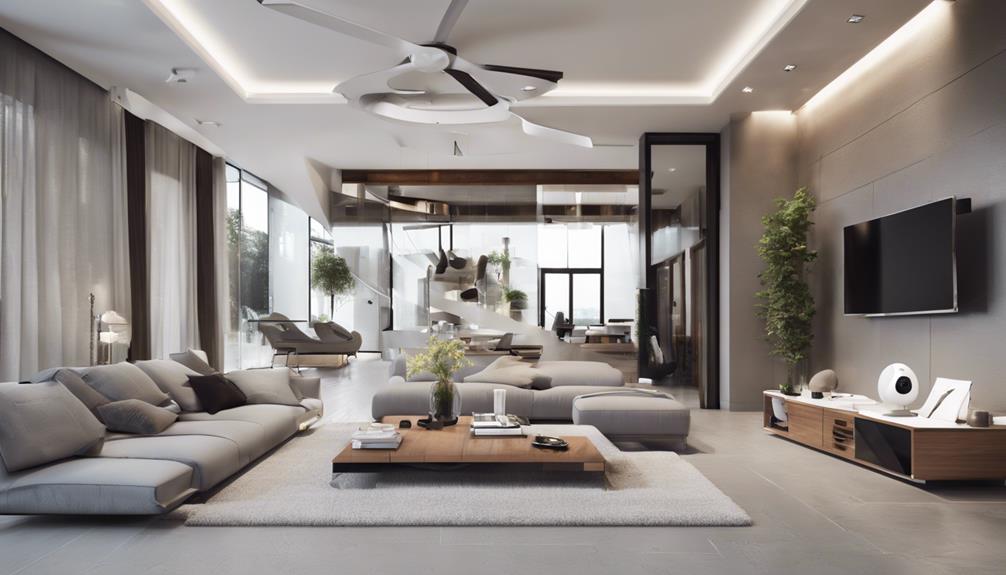A home security system's cost varies based on several factors such as equipment, installation, monitoring, and maintenance. Basic equipment starts at around $200, while high-end options can exceed $1,000. Professional installation ranges from $100 to several hundred dollars, though DIY can save you money. Monitoring fees, ensuring 24/7 vigilance, range from $15 to $70 per month. Regular maintenance, including battery replacement and software updates, is essential and an added expense. Opting for smart home integrations or professional plans can increase overall costs but offer enhanced features. Want to get a clearer picture of what's involved?
Key Takeaways
- Initial equipment costs range from basic sensors/control panels to advanced cameras/smart locks, impacting overall expenses.
- Professional installation fees can vary from $100 to several hundred dollars, while DIY installation can reduce costs.
- Monthly monitoring fees range from $15 to $70, with different service levels and features.
- Regular maintenance, including battery replacements and software updates, adds to long-term costs.
- Comparing providers like ADT, SimpliSafe, and Ring helps identify varying costs and features to match your budget and needs.
Equipment Costs
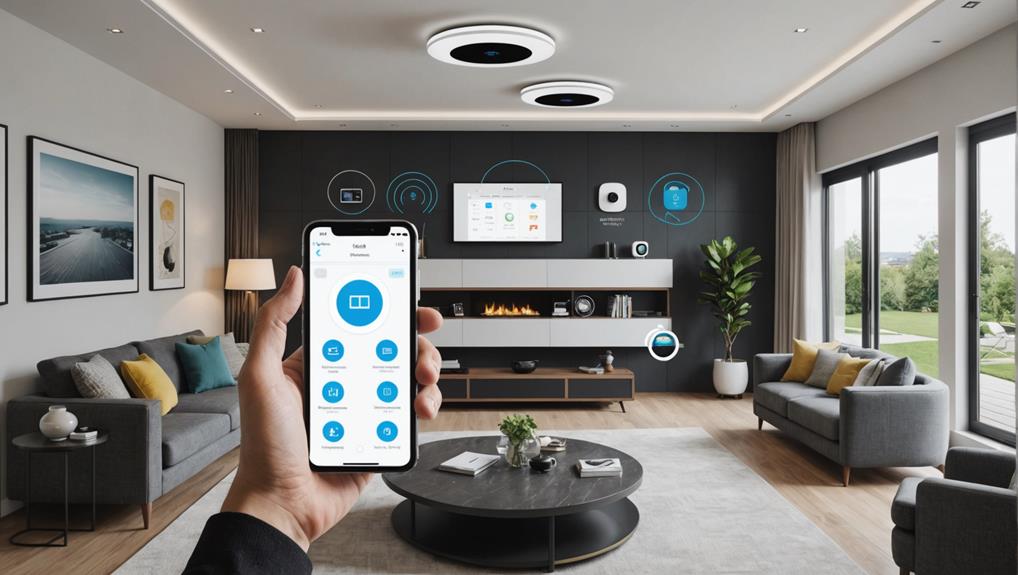
When considering a home security system, equipment costs are one of the primary factors to think about. You need to understand that the home security system cost can vary greatly based on the type and quality of the equipment you choose.
Basic packages might include essential items like door sensors, window sensors, and a control panel. These packages generally have a lower initial cost, making them accessible if you're on a budget but still want to protect others.
However, if you aim to offer extensive protection, you might consider more advanced equipment. High-definition cameras, smart locks, and environmental sensors can add up quickly. These enhancements do raise the security system pricing but provide added layers of security, guaranteeing you can better serve and protect your loved ones and community.
When evaluating equipment costs, don't just focus on the initial price. Think about the long-term value and reliability of the system. Investing in high-quality equipment guarantees fewer malfunctions and better performance over time.
Installation Fees
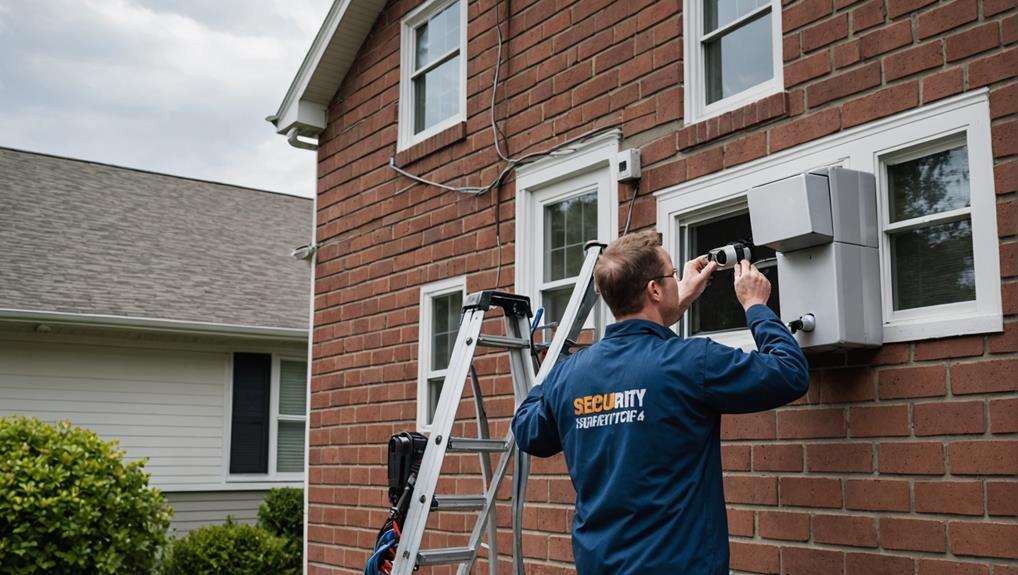
While equipment costs form a considerable part of your investment, installation fees are another essential aspect to contemplate. When you're aiming to safeguard your home and loved ones, understanding all the elements of the total security costs is imperative.
Installation fees can vary widely based on the complexity of the system and whether you opt for professional installation or a DIY approach. According to a detailed analysis, these choices greatly impact long-term expenses.
Professional installation can offer peace of mind, ensuring that all components are correctly set up and functioning. However, this convenience comes at a price, which can range from $100 to several hundred dollars, depending on the service provider and the system's complexity. These fees are part of the overall cost of home security, and they're necessary to budget for.
On the other hand, if you're handy and prefer a DIY route, many companies offer systems that are designed for easy self-installation. This option can greatly reduce your installation fees, but it requires time and effort on your part.
Choosing the right path depends on your comfort level and willingness to invest time or money. Weighing these factors will help you make an informed decision, ensuring that your total security costs align with your goals of protecting and serving those you care about.
Monitoring Charges
Monitoring charges are a crucial component of your home security system's ongoing costs. These fees guarantee that your system remains vigilant 24/7, providing peace of mind for you and your loved ones. When you consider the cost breakdown, it's important to understand what you're paying for and how it fits into your budget.
Typically, monitoring fees cover services like professional monitoring, emergency response coordination, and sometimes mobile app access. Here's a snapshot of what you can expect regarding security system fees:
| Service | Monthly Cost Range |
|---|---|
| Basic Monitoring | $15 – $30 |
| Cellular Monitoring | $20 – $40 |
| Interactive Monitoring | $30 – $50 |
| Video Monitoring | $40 – $65 |
| Premium Packages | $50 – $70 |
These fees can vary based on the provider and the specific services included. Basic monitoring might be sufficient if you're looking for budget-friendly options, while premium packages offer advanced features like video surveillance and home automation, making them ideal for those wanting extensive protection.
Understanding these monitoring charges allows you to make informed decisions that align with your desire to serve others by guaranteeing their safety. Remember, investing in reliable monitoring not only protects your home but also provides invaluable peace of mind.
Maintenance Expenses
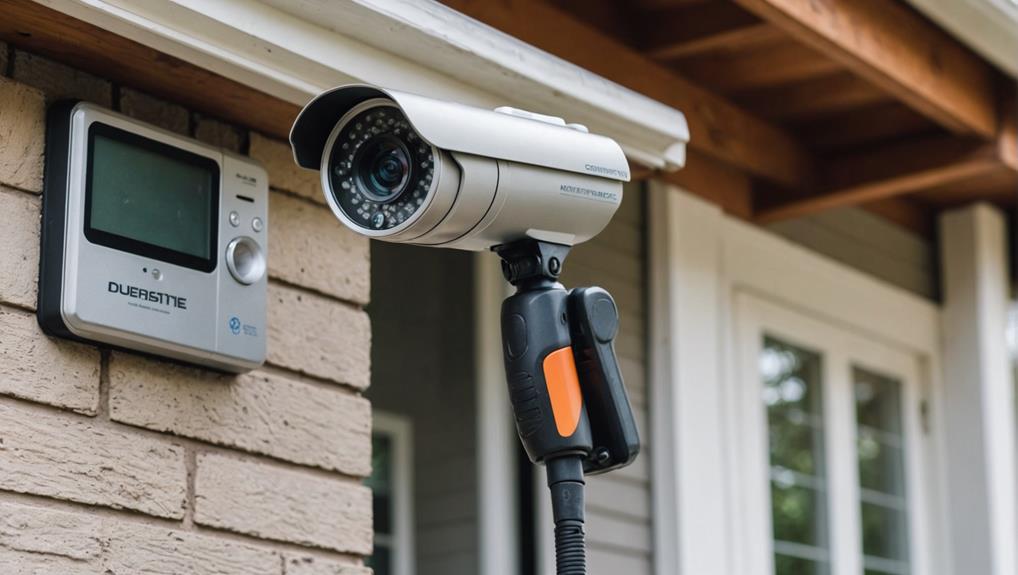
Maintaining your home security system involves regular equipment checks, battery replacement costs, and software update fees.
Additionally, you'll need to account for periodic equipment updates and repairs, which can add to the overall expense.
You'll need to budget for these recurring expenses to guarantee your system runs smoothly.
Ignoring maintenance can lead to malfunctions or vulnerabilities in your security setup.
Regular Equipment Checks
Regular equipment checks are essential to guarantee your home security system functions effectively and provides the protection you need. By routinely inspecting your security equipment, you confirm that every component works as it should, minimizing risks and maximizing safety.
For those who are committed to serving and protecting their loved ones, regular checks are non-negotiable.
Your home protection expenses will include these maintenance activities, which might involve inspecting cameras, sensors, and control panels. These checks help identify potential issues before they become significant problems, confirming your system's longevity and reliability.
Regular maintenance also allows you to stay ahead of any malfunctions that could compromise your home's security.
Most home security companies offer maintenance plans that include regular equipment checks. While these plans might add to your home protection expenses, they provide peace of mind by confirming your system is always in top condition.
Doing it yourself is an option, but professional checks often catch issues you might miss.
Battery Replacement Costs
One of the recurrent expenses you'll encounter with a home security system involves battery replacements.
Making sure your system's batteries are always fresh and functional is vital for maintaining seamless protection for your loved ones. Neglecting this can lead to system failures at critical moments, compromising your home's safety.
Here are some key points to reflect on:
- Battery Lifespan: Most security system batteries last between 1 to 3 years. Regularly checking their status helps you stay ahead of any potential issues.
- Cost of Replacement: Depending on the type and brand, batteries can cost anywhere from $10 to $50 each. Factor in the number of devices you have to estimate your total expense.
- Professional vs. DIY Replacement: While replacing batteries yourself saves money, hiring a professional guarantees the job is done correctly and provides peace of mind.
- Environmental Considerations: Proper disposal of old batteries is essential. Many batteries contain harmful chemicals, so recycling them at designated centers helps protect the environment.
Software Update Fees
Keeping your home security system's software up-to-date is vital for ideal performance and protection. Doing so guarantees you're always equipped with the latest features and safeguards against emerging threats. Regular software updates often include important security patches, new functionalities, and improvements to existing features, which can greatly enhance your system's reliability.
However, staying current doesn't come without costs. Some security system providers charge a fee for software updates, while others include them in their subscription plans. It's important to understand your provider's policy to avoid unexpected expenses. On average, you might spend between $50 to $200 annually on software update fees, depending on the complexity and frequency of the updates.
Being proactive about software updates not only keeps your home safer but also demonstrates your commitment to serving your family and community. A well-maintained security system can prevent breaches and provide peace of mind for everyone around you.
Smart Home Integration
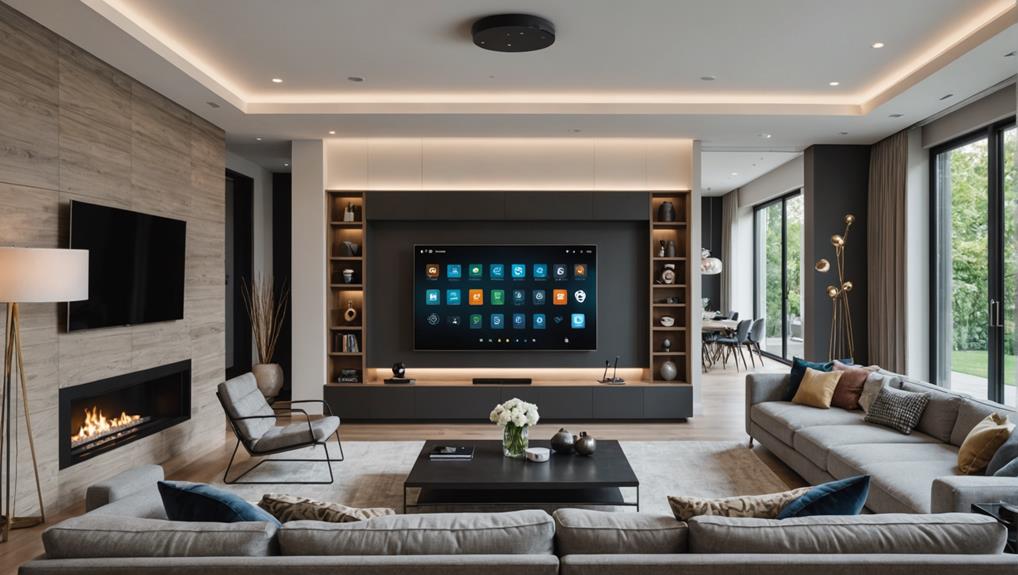
Integrating your home security system with smart home technology can greatly enhance convenience and control. Imagine being able to monitor your home remotely, adjust settings, and receive alerts—all from your smartphone. This seamless integration makes it easier to manage your home's safety, especially if you're someone who cares deeply about the well-being of others in your household.
With smart security systems changing the way homeowners protect their properties, the benefits become increasingly evident.
Here are four key benefits of incorporating smart home technology into your security system:
- Remote Monitoring: You can check live video feeds, arm or disarm your system, and receive real-time alerts from anywhere. This is especially beneficial when you're away and want to guarantee your family is safe.
- Automated Responses: Integrate your security system with other smart devices like lights and thermostats. For instance, if a security breach is detected, your lights can turn on automatically to deter intruders.
- Voice Control: Use voice assistants like Amazon Alexa or Google Assistant to control your security system hands-free. This feature is particularly useful for elderly or disabled family members.
- Energy Efficiency: Smart home integration often includes energy-saving features. You can schedule your lights and thermostats to turn off when you're not home, reducing energy consumption and costs.
DIY vs. Professional Systems
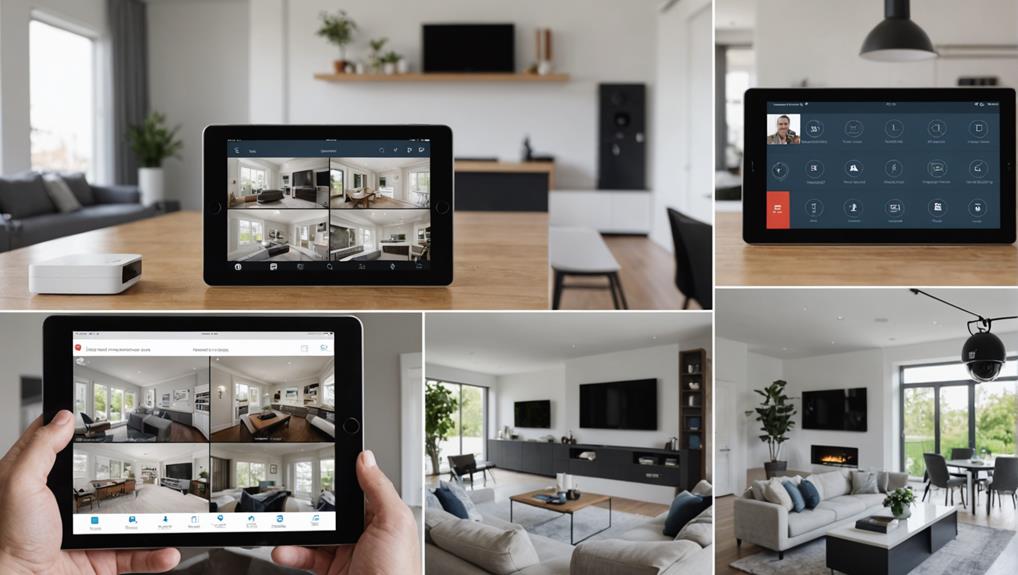
While smart home integration undeniably enhances the functionality of your security system, deciding between a DIY or professional setup is the next step in safeguarding your home. DIY systems offer flexibility and can be tailored to fit your specific needs. You'll have the satisfaction of knowing you installed everything yourself and can adjust it as needed. However, this route demands time, effort, and a degree of technical know-how.
On the other hand, professional systems provide peace of mind with expert installation and ongoing support. If you're focused on serving others, you might appreciate the seamless operation and quick response times that professionals can offer. The downside? These services often come with higher upfront costs and monthly fees.
Consider the following comparison:
| Feature | DIY Systems | Professional Systems |
|---|---|---|
| Installation | Self-installed | Expert installation |
| Flexibility | Highly customizable | Less customizable |
| Support | Limited to online resources | 24/7 professional support |
Choosing the right path depends on your comfort level with technology and your willingness to invest time versus money. Whether you choose DIY or professional, prioritize what will best protect your loved ones and serve your community effectively.
Long-Term Costs
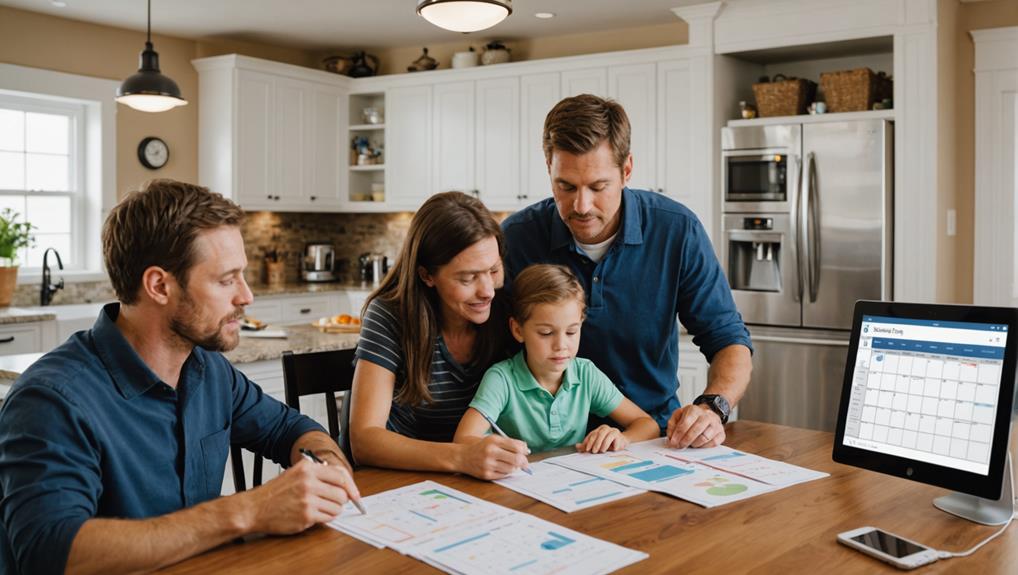
Beyond the initial investment, it's crucial to take into account the long-term costs associated with home security systems. These ongoing expenses can add up over time, and understanding them will help you make a well-informed decision that best serves your needs and those of your loved ones.
For those seeking affordable security devices, it's significant to weigh these costs carefully.
- Monthly Monitoring Fees: Most professional systems require a monthly fee for monitoring services. These fees can range from $20 to $60 a month, depending on the level of service and features you choose.
- Maintenance and Repairs: Over time, your system's components may need maintenance or repairs. While some providers offer warranties, others may charge for these services. Setting aside a small budget for unexpected repairs is a smart move.
- Equipment Upgrades: As technology evolves, you might want to upgrade your equipment to keep your home secure. Upgrading can involve additional costs, but staying updated ensures you benefit from the latest advancements.
- Battery Replacements: Wireless systems rely on batteries, which will need replacing periodically. Depending on your system, battery costs can vary, but they're a recurring expense you shouldn't overlook.
Comparing Providers
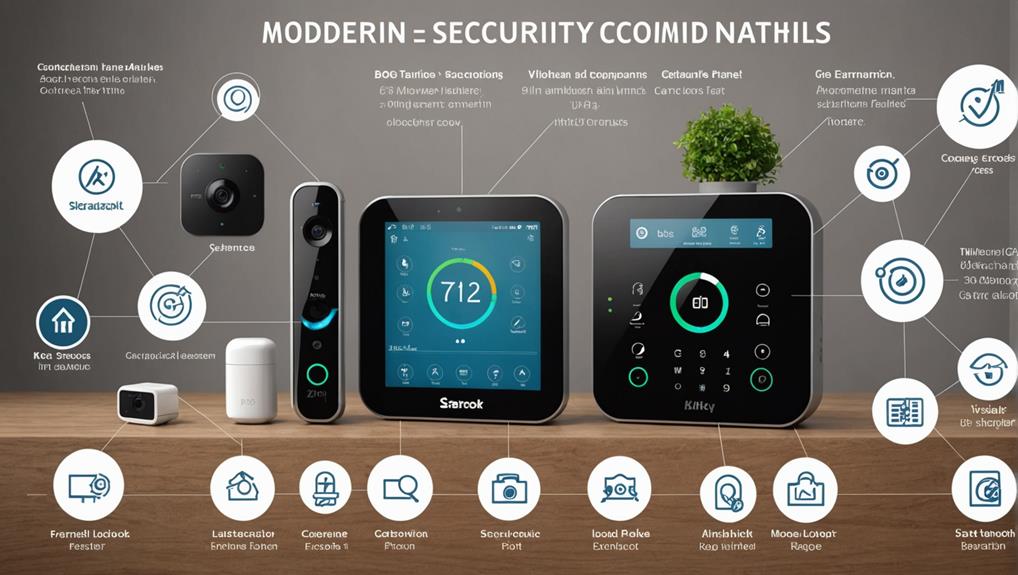
Choosing the right home security provider can seem overwhelming, given the myriad options available. You want to verify that your choice aligns with your priorities of protecting your loved ones and serving your community.
Start by researching well-known providers like ADT, SimpliSafe, and Ring. Each offers unique packages and pricing structures. It's also important to evaluate whether you prefer a wireless or wired system based on your home's needs and your personal preferences.
ADT, for instance, is renowned for professional monitoring and extensive customer support. It's ideal if you value a robust and reliable system but are willing to pay a premium.
SimpliSafe, on the other hand, offers flexibility with no contracts and DIY installation, perfect if you prefer a hands-on approach and want to avoid long-term commitments.
Ring is budget-friendly, emphasizing smart home integration, which can be a boon if you're tech-savvy and appreciate modern conveniences.
Compare their features: monitoring options, equipment quality, and customer service. Don't just look at costs; evaluate the value they provide. Are there hidden fees? What's the response time during emergencies?
Reading customer reviews and asking for recommendations can also provide insights. By thoroughly comparing providers, you'll find one that not only fits your budget but also upholds your commitment to safeguarding those you care about.
Frequently Asked Questions
Are Home Security Systems Effective in Deterring Burglars?
You're probably wondering if home security systems actually deter burglars. They do. Studies show that homes with security systems are less likely to be targeted by intruders.
When you install one, you're taking a proactive step to protect your loved ones and property. You're also contributing to a safer neighborhood, as visible security measures can deter crime in surrounding areas.
It's about serving your community and ensuring everyone's safety.
How Do Home Security Systems Impact Home Insurance Premiums?
By installing a home security system, you're not only protecting your home but also potentially lowering your home insurance premiums.
Insurance companies often offer discounts because a secured home is less likely to be burglarized, leading to fewer claims.
This can be a great way to serve your household by ensuring their safety and saving money.
Check with your insurance provider to see what discounts they offer for security systems.
Can Home Security Systems Work During Power Outages?
Yes, home security systems can work during power outages. Many systems have battery backups that kick in when the power goes out, guaranteeing your home stays protected.
If you're the type who loves to secure the safety and well-being of others, knowing your security system remains operational during blackouts is essential.
You'll have peace of mind, and you'll be ready to help neighbors in need during emergencies.
What Are the Privacy Concerns With Home Security Cameras?
You've got to think about privacy concerns with home security cameras.
They can record footage that might be accessed by hackers or even shared without your consent. Always verify you're using strong passwords and updating software.
It's also important to inform guests about the cameras. By being transparent, you're respecting their privacy and fostering trust.
Prioritizing security and privacy helps you serve and protect your loved ones better.
Are There Legal Regulations for Home Security System Usage?
Yes, you're wondering about legal regulations for home security systems.
There are rules you need to follow to respect others' privacy. You can't place cameras where there's an expectation of privacy, like bathrooms or bedrooms.
Informing guests about surveillance can also be essential. Local laws vary, so it's smart to check specific regulations in your area.
Always prioritize ethical considerations to guarantee you're protecting, not infringing on, others.
Conclusion
When you're considering a home security system, it's important to look at all the costs—equipment, installation, and monitoring fees, plus maintenance and smart home integration. Whether you choose a DIY setup or go with a professional service, weigh the long-term expenses and compare providers to find the best fit. Taking the time to evaluate these factors will help you make an informed decision, ensuring your home is both secure and cost-effective.

